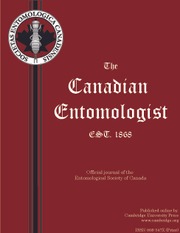Crossref Citations
This article has been cited by the following publications. This list is generated based on data provided by
Crossref.
Berryman, A. A.
and
Ashraf, M.
1970.
EFFECTS OF ABIES GRANDIS RESIN ON THE ATTACK BEHAVIOR AND BROOD SURVIVAL OF SCOLYTUS VENTRALIS (COLEOPTERA: SCOLYTIDAE).
The Canadian Entomologist,
Vol. 102,
Issue. 10,
p.
1229.
Smeljanez, W. P.
and
Matowich, L. W.
1973.
Zur Tagesdynamik des Harzdruckes und der Harzabsonderung sowie ihre Bedeutung für den Befall der Kiefer durch den TriebwicklerRhyacionia buoliana Schiff. (Lep., Tortricidae).
Anzeiger für Schädlingskunde Pflanzen- und Umweltschutz,
Vol. 46,
Issue. 7,
p.
104.
Berryman, Alan A.
1973.
POPULATION DYNAMICS OF THE FIR ENGRAVER, SCOLYTUS VENTRALIS (COLEOPTERA: SCOLYTIDAE): I. ANALYSIS OF POPULATION BEHAVIOR AND SURVIVAL FROM 1964 TO 1971.
The Canadian Entomologist,
Vol. 105,
Issue. 11,
p.
1465.
Ferrell, George T.
1974.
MOISTURE STRESS AND FIR ENGRAVER (COLEOPTERA: SCOLYTIDAE) ATTACK IN WHITE FIR INFECTED BY TRUE MISTLETOE.
The Canadian Entomologist,
Vol. 106,
Issue. 3,
p.
315.
Hertert, H. D.
Miller, D. L.
and
Partridge, A. D.
1975.
INTERACTION OF BARK BEETLES (COLEOPTERA: SCOLYTIDAE) AND ROOT-ROT PATHOGENS IN GRAND FIR IN NORTHERN IDAHO.
The Canadian Entomologist,
Vol. 107,
Issue. 8,
p.
899.
Smelyanets, V. P.
1977.
Mechanisms of plant resistance in pine trees, Pinus sylvestris.
Zeitschrift für Angewandte Entomologie,
Vol. 83,
Issue. 1-4,
p.
225.
Bordasch, Robert P.
and
Berryman, Alan A.
1977.
HOST RESISTANCE TO THE FIR ENGRAVER BEETLE, SCOLYTUS VENTRALIS (COLEOPTERA: SCOLYTIDAE): 2. REPELLENCY OF ABIES GRANDIS RESINS AND SOME MONOTERPENES.
The Canadian Entomologist,
Vol. 109,
Issue. 1,
p.
95.
YOSHIKAWA, Ken
1977.
Population Study of Pine Bark Weevils (Coleoptera : Curculionidae) in Bait Logs.
Applied Entomology and Zoology,
Vol. 12,
Issue. 1,
p.
9.
Smelyanets, V. P.
1977.
Mechanisms of plant resistance in Scotch pine (Pinus silvestris).
Zeitschrift für Angewandte Entomologie,
Vol. 84,
Issue. 1-4,
p.
113.
Wright, L. C.
Berryman, A. A.
and
Gurusiddaiah, S.
1979.
HOST RESISTANCE TO THE FIR ENGRAVER BEETLE, SCOLYTUS VENTRALIS (COLEOPTERA: SCOLYTIDAE): 4. EFFECT OF DEFOLIATION ON WOUND MONOTERPENE AND INNER BARK CARBOHYDRATE CONCENTRATIONS.
The Canadian Entomologist,
Vol. 111,
Issue. 11,
p.
1255.
1981.
Biology of Insect Eggs.
p.
779.
Raffa, Kenneth F.
and
Berryman, Alan A.
1982.
ACCUMULATION OF MONOTERPENES AND ASSOCIATED VOLATILES FOLLOWING INOCULATION OF GRAND FIR WITH A FUNGUS TRANSMITTED BY THE FIR ENGRAVER, SCOLYTUS VENTRALIS (COLEOPTERA: SCOLYTIDAE).
The Canadian Entomologist,
Vol. 114,
Issue. 9,
p.
797.
Christiansen, E.
and
Horntvedt, R.
1983.
Combined Ips/Ceratocystis attack on Norway spruce, and defensive mechanisms of the trees1.
Zeitschrift für Angewandte Entomologie,
Vol. 96,
Issue. 1-5,
p.
110.
Ferrell, George T.
1983.
HOST RESISTANCE TO THE FIR ENGRAVER, SCOLYTUS VENTRALIS (COLEOPTERA: SCOLYTIDAE): FREQUENCIES OF ATTACKS CONTACTING CORTICAL RESIN BLISTERS AND CANALS OF ABIES CONCOLOR.
The Canadian Entomologist,
Vol. 115,
Issue. 10,
p.
1421.
Hain, F. P.
Mawby, W. D.
Cook, S. P.
and
Arthur, F. H.
1983.
Host conifer reaction to stem invasion1.
Zeitschrift für Angewandte Entomologie,
Vol. 96,
Issue. 1-5,
p.
247.
Christiansen, E.
1985.
Ceratocysts polonica inoculated in Norway spruce: Blue‐staining in relation to inoculum density, resinosis and tree growth.
European Journal of Forest Pathology,
Vol. 15,
Issue. 3,
p.
160.
Christiansen, E.
1985.
Ips/Ceratocystis‐infection of Norway spruce: what is a deadly dosage?1.
Zeitschrift für Angewandte Entomologie,
Vol. 99,
Issue. 1-5,
p.
6.
Mulock, Peter
and
Christiansen, Erik
1986.
The threshold of successful attack by Ips typographus on Picea abies: A field experiment.
Forest Ecology and Management,
Vol. 14,
Issue. 2,
p.
125.
Berryman, Alan A.
1986.
Forest Insects.
p.
213.
Miller, R.H.
Berryman, A.A.
and
Ryant, C.A.
1986.
Biotic elicitors of defense reactions in lodgepole pine.
Phytochemistry,
Vol. 25,
Issue. 3,
p.
611.


